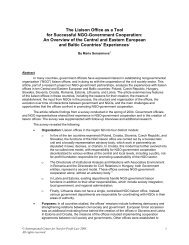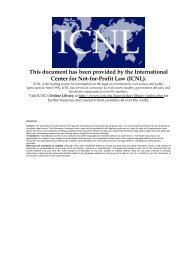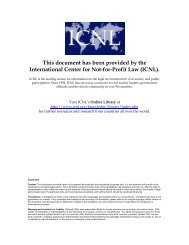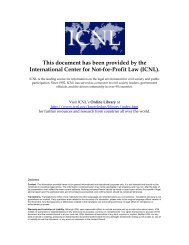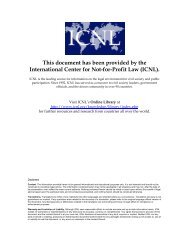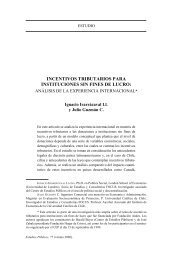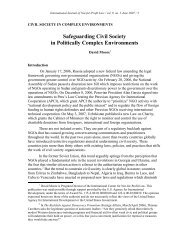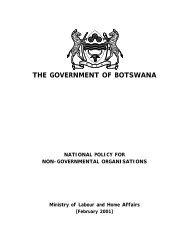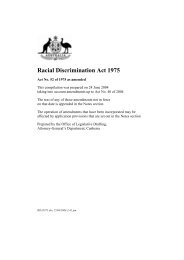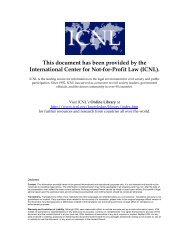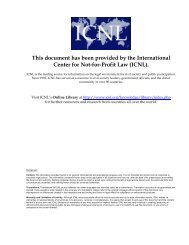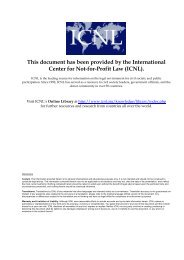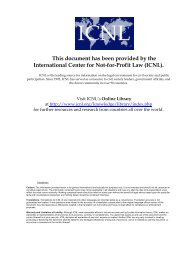Russia - NGO Law Monitor - Research Center - ICNL
Russia - NGO Law Monitor - Research Center - ICNL
Russia - NGO Law Monitor - Research Center - ICNL
Create successful ePaper yourself
Turn your PDF publications into a flip-book with our unique Google optimized e-Paper software.
<strong>Russia</strong> - <strong>NGO</strong> <strong>Law</strong> <strong>Monitor</strong> - <strong>Research</strong> <strong>Center</strong> - <strong>ICNL</strong><br />
http://www.icnl.org/research/monitor/russia.html[11/15/2012 2:02:58 PM]<br />
Organizational Forms<br />
The <strong>Russia</strong>n Federation (<strong>Russia</strong>) recognizes a large number of organizational forms of non-governmental,<br />
non-commercial organizations (NCOs), resulting in a complex and oftentimes contradictory regulatory<br />
framework. The Civil Code and the Federal <strong>Law</strong> on Non-commercial Organizations (NCO <strong>Law</strong>) establish the<br />
primary NCO legal framework and define a variety of NCO forms (approximately 27), including public<br />
organizations, foundations, institutions, non-profit partnerships, and autonomous non-governmental<br />
organizations. The primary requirements are that NCOs, whatever their type, do not have the generation of<br />
profit as their primary objective and do not distribute any such profit among their participants (Article 50(1),<br />
Civil Code). The Federal <strong>Law</strong> on Public Associations builds upon this framework and carves out a subcategory<br />
of NCOs called "public associations" which consist of public organizations, mass movements, public<br />
foundations, public institutions, and several other forms. Some 220,000 NCOs are registered in <strong>Russia</strong>;<br />
approximately 70% of them are public associations.<br />
Public Benefit Status<br />
NCOs may register as a charity pursuant to the Charities <strong>Law</strong>. Federal law, however, does not provide any<br />
benefits that are particular to registered charities. Although legislation at the regional and local levels offers<br />
tax benefits to charities, they do not necessarily require the organization to be registered as a charity at the<br />
federal level. Tax benefits under <strong>Russia</strong>n law are primarily tied to the support or performance of particular<br />
activities specified in the Tax Code. Registration of an NCO as a charity pursuant to the Charities <strong>Law</strong><br />
provides the organization with a particular status and subjects the organization to heightened scrutiny, but<br />
this status does not in itself provide any unique tax benefits.<br />
Amendments enacted to the NCO <strong>Law</strong> in April 2010 introduced the status of “socially oriented” organizations.<br />
Under the new law, socially oriented organizations will be eligible for governmental support and preferential<br />
tax treatment. <strong>NGO</strong>s engaged in a broad range of activities, including traditional charitable work, the<br />
provision of free-of-charge legal aid and the protection of human rights, will be eligible for the new legal<br />
status, and in turn, for governmental support.<br />
Barriers to Entry<br />
<strong>Russia</strong>n law defines certain restrictions regarding potential founders of NCOs. Regarding non-citizens, only<br />
those foreign nationals and stateless persons who are “legally domiciled in the <strong>Russia</strong>n Federation” may be<br />
founders, members, or participants in public associations or NCOs. Certain persons may not become<br />
founders, members or participants, including:<br />
Foreign nationals or stateless persons whose stay is deemed “undesirable”;<br />
Persons appearing on a money laundering and anti-terrorist financing watch list maintained by the<br />
<strong>Russia</strong>n government;<br />
Organizations that have been suspended under the <strong>Law</strong> Countering Extremist Activities;<br />
Persons found by court decision to show signs of participating in extremist activity; and<br />
Persons who are currently incarcerated as a result of conviction of a crime.<br />
Public associations, such as public organizations and public foundations, by definition can be created only by<br />
natural persons. These organizations cannot be founded by legal persons, but other public organizations may<br />
join as members (Articles 18 and 19, <strong>Law</strong> on Public Associations). By comparison, legal persons, including<br />
commercial entities, may found all other forms of NCOs.<br />
A non-commercial organization shall be subject to state registration in compliance with the NCO law and<br />
Federal <strong>Law</strong> No. 129-FZ of August 8, 2001 on the State Registration of Legal Entities and Individual<br />
Businessmen (hereinafter referred to as the Federal <strong>Law</strong> on State Registration of Legal Entities and Individual<br />
Businessmen). Public associations shall be subject to state registration in compliance with the <strong>Law</strong> on Public<br />
Associations and Federal <strong>Law</strong> on State Registration of Legal Entities and Individual Businessmen. The<br />
registration process for all types of <strong>NGO</strong>s is overly bureaucratic, with a long list of documents required to be<br />
submitted to the authorized governmental body. The same is true for foreign <strong>NGO</strong>s seeking to establish a<br />
branch office.<br />
Barriers to Operational Activity<br />
Public associations, with the exception of specialized organizations such as trade unions and political<br />
associations, have virtually no restrictions on the activities they may pursue as their primary objectives (Article<br />
5, <strong>Law</strong> on Public Associations), including mutual benefit activities (Article 6(1), NCO <strong>Law</strong>, and Article 8, <strong>Law</strong><br />
on Public Associations).<br />
All foundations are required to engage in public benefit activities (Article 118(1), Civil Code, Article 7(1), NCO<br />
<strong>Law</strong>, and Article 10, <strong>Law</strong> on Public Associations). The primary activities of institutions are broadly defined as



